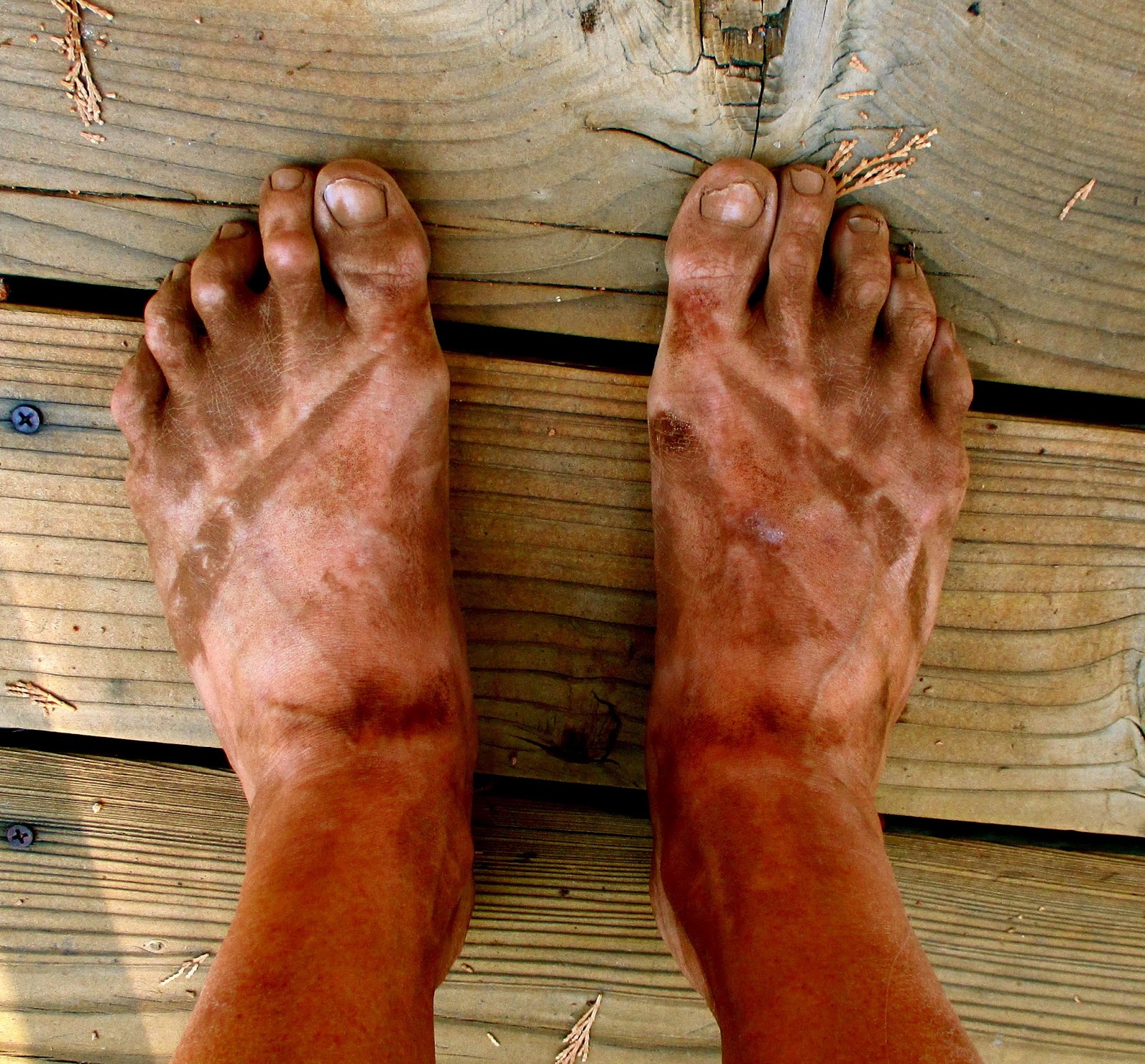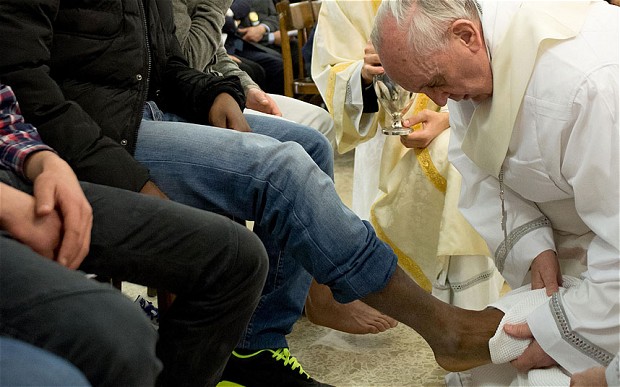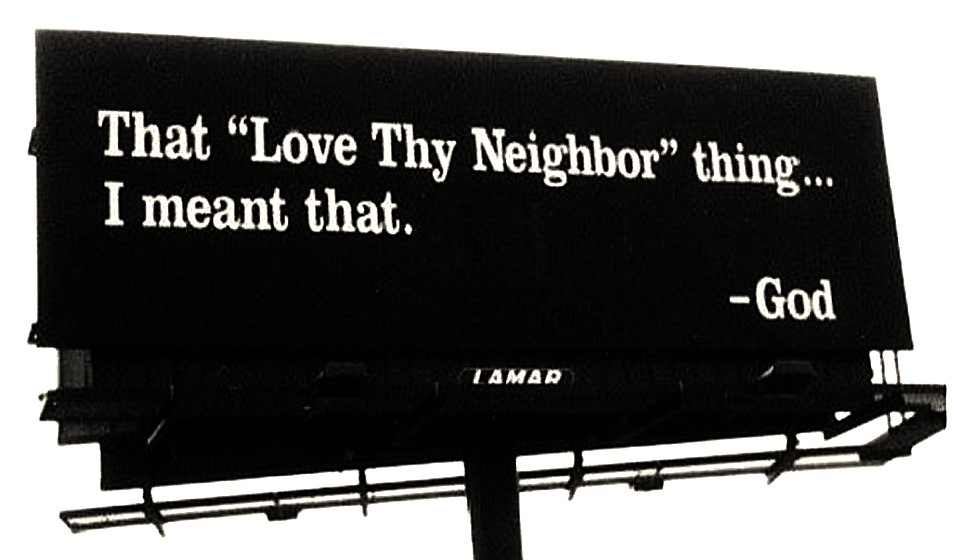 As a Campus Minister at a Catholic college I am always looking for ways to invite students to enter more deeply into their faith through prayerful experiences. It’s one thing to read about our faith or talk about it, and it’s another thing to experience it through prayer and ritual. So, as we approached Holy Week this year, I made a proposal to a group of student leaders as we planned for a weekly gathering of Catholic students:
As a Campus Minister at a Catholic college I am always looking for ways to invite students to enter more deeply into their faith through prayerful experiences. It’s one thing to read about our faith or talk about it, and it’s another thing to experience it through prayer and ritual. So, as we approached Holy Week this year, I made a proposal to a group of student leaders as we planned for a weekly gathering of Catholic students:
“What if we hosted a foot-washing experience at our weekly meeting?” I suggested. Much to my dismay, their unanimous reply was, “No, that would be weird. That would be awkward. No one would come.”
I suppose that I should not have been surprised by this reaction. Feet are not the most pleasant part of the body. They are not particularly beautiful (unless pedicured, of course) and they touch their share of dirt and bacteria and consequently often take on an odious aroma. Furthermore, I probably would have reacted similarly when I was in college. The last thing I wanted to do when I was in college was put myself or someone else in an awkward situation like washing another person’s feet.
And yet, feet were no less gross in Jesus’ time than they are today. Actually, it is fair to say that it was more disgusting to wash feet back than it is today. People wore sandals all day everyday, walked everywhere, and walked primarily on dirt roads. After a day of walking in those conditions, I don’t imagine their feet looked or smelled particularly pretty. Thus, foot-washing was a sign of hospitality that a host provided to his guests. Of course, a host would rarely, if ever, actually wash the feet of his guests. This was something that the host’s servant would do on his behalf for his guests. And it is within this context that Jesus’ decision to wash his disciples feet becomes all the more remarkable!
 Dirty Work
Dirty Work
The disciples call Jesus “Teacher” and “Lord,” but he chooses to become their servant. And he chooses do the dirty work that often comes with serving others. Peter knew this was a dirty job, and he dared to question Jesus, “Lord, are you going to wash my feet?” Can you imagine Peter saying this to Jesus? I bet that Peter was horrified at the idea of Jesus, his friend and master, doing such a disgusting task for him. Perhaps this hints at the discomfort that my student leaders felt when I suggested we imitate Jesus and wash each other’s feet. But perhaps, Peter was also moved by Jesus’ tremendous act of humility. If foot-washing is a sign of hospitality, and hospitality is an act of love for guests, then what does it mean that Jesus humbles himself to wash Peter’s feet? Peter must have found himself utterly humbled by such love and generosity.
While we do not know exactly what Peter was thinking at the foot-washing, we do know that what Jesus did was significant, for he tells immediately after he does it.
“So if I, your Lord and Teacher, have washed your feet, you also ought to wash one another’s feet. For I have set you an example, that you also should do as I have done for you.”
Call it didactic service. Call it a teachable moment. What is clear is that Jesus tells us that we ought to wash one another’s feet. He sets an example and invites us to do likewise.
What does this mean for you and me? Does this mean we should go around with a jug of Poland Spring, a bucket, and a towel and ask people on public transportation if they would like a complimentary foot-washing on their ride to the work in the morning? As amusing as that experience might be, I wonder what else it could mean for us.
What does humble service look like in your life? What would it be like for you to wash your friends’ feet? How might God be inviting you to greater humility?
Maybe it looks like cleaning up after your roommate even though they may not notice. Maybe it means valuing a friendship over winning an argument. Maybe it entails letting someone else take credit for something you did or letting go of the need to be praised and recognized.
I don’t know what it looks like in your life (and I am still trying to figure out what it means in my own), but I think that is part of the beauty of it all. Just as our feet come in many different shapes and sizes, so does our service and the way in which God invites us to humility, wholeness, and holiness.
How is God calling you to wash the feet of those who cross your path?









In a rural village I invited people to wash each others’ feet after I washed the feet of twelve in our Holy Thursday liturgy this year. After a little coaxing they did it.
But I reminded them that washing each others’ feet is a dirty business – just like changing baby diapers (especially here where there are very few disposables). I even challenged the men to change diapers – though some have been doing this.
Well done~ I am now far from your target audience of college age students but relating to your message was easy. Thank you. Your direct examples of how each of us could “wash another’s feet” were perfect. At any age giving up the need to be thanked and recognized for our good deeds is a challenge. We want our ego to be stroked. We want gratitude. We crave recognition. Simply helping out and bettering someone else’s situation can be an end in itself if we choose to offer it to God. We can make heaven or hell for those we encounter daily. We are asked to offer love and bring about the Kingdom in this now. Blessings~ keep on keepin on~ your students are lucky they have you. Kathy
I am studying foot washing because my church practices it. I have not participated in the practice because I have feet that aren’t well taken care of. I am ashamed for anyone to see them. I am working on taking better care of my feet so I can accept the challenge to participate in the practice in obedience to Jesus’ command.